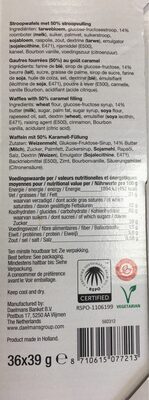Stroopwafels verpakt single pack - Jumbo - 36 x 39 g
This product page is not complete. You can help to complete it by editing it and adding more data from the photos we have, or by taking more photos using the app for Android or iPhone/iPad. Thank you!
×
Barcode: 8710615077213 (EAN / EAN-13)
Quantity: 36 x 39 g
Brands: Jumbo
Categories: Snacks, Sweet snacks, Biscuits and cakes, Biscuits, Wafers, Stuffed wafers, Caramel stuffed wafers
Labels, certifications, awards:
Sustainable, Sustainable Palm Oil, Roundtable on Sustainable Palm Oil
Stores: Jumbo
Countries where sold: France, Netherlands
Matching with your preferences
Environment
Carbon footprint
Packaging
Transportation
Report a problem
Data sources
Product added on by kiliweb
Last edit of product page on by bertusdendroef.
Product page also edited by roboto-app, teolemon, worldtest, yuka.R0tJNk5xTUZpOVVVZ2RvejkwUGJvKzV6eHEzd2VIdVFBUG9LSVE9PQ.
If the data is incomplete or incorrect, you can complete or correct it by editing this page.










